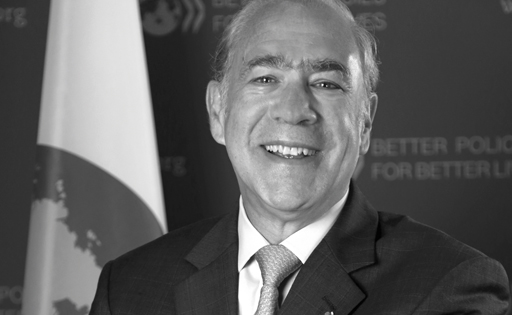Ángel Gurría

A multilateral
region
Over the past 25 years, there has been too much human suffering, too many displaced populations, and too many broken hopes and dreams.
In 1995, visionary leaders from the European Union and other Mediterranean communities proposed a bold and forward-looking initiative – the Barcelona Process – to build on the longstanding cultural, economic and social links between the two shores of the Mediterranean and to bridge divisions and create prosperity in the region. This year, we celebrate the 25th anniversary of this landmark initiative. As the world grapples with the challenges of the COVID-19 pandemic and the prospects of a prolonged global economic slowdown, it is clear that our future prosperity will depend crucially on our ability to work better, together.
In 1995, there were many elements working against Euro-Mediterranean co-operation: different political systems, huge differentials in GDP per capita between neighbouring countries, and entrenched geopolitical complexity. Yet, there was also a determination to find common ground and foster peace, stability and shared prosperity. Over the past 25 years, Mediterranean societies have undergone profound transformations, particularly in terms of women’s roles in society and the economy. The OECD has accompanied this process, making gender equality a core objective of our Organisation and promoting – together with our Mediterranean partners – the full political and economic empowerment of women. Cultural interactions and new forms of social media have reshaped our societies. Mediterranean people – particularly the youth – share values, the aspiration to live in peace and security, and a desire for prosperity and clean environments.
The Barcelona process has guided this transformation over the last 25 years. Now we need to look ahead to the next 25 years.
The OECD has a deep connection with the Euro-Mediterranean region, which is a perfect synthesis of our global character. We are proud to have several Members from the Mediterranean shores; ambitious country programmes with Mediterranean partners, such as Morocco and Egypt; and two regional programmes, which are the oldest of our Organisation, the South East Europe Regional Programme and the MENA-OECD Initiative for Governance and Competitiveness. Our new Centre in Istanbul will support OECD’s efforts to contribute to the integration and prosperity of the Euro-Mediterranean region. We are also working hand-in-hand with our partner organisation, the Union for the Mediterranean, to promote economic integration in the region and women’s empowerment.
The 25th anniversary of the Barcelona Process coincides with a period of unprecedented global uncertainty. Many Euro-Mediterranean countries have been severely affected by the COVID-19 pandemic, and all will suffer profound economic consequences, as outlined in the OECD’s latest Economic Outlook. It is now more important than ever to build together a common agenda, based on the following principles.
First, it should be people-centered. The Euro-Mediterranean region remains characterised by high levels of economic disparity, both among and within countries. Economic development strategies need to be inclusive and focus on drivers of growth that hold the greatest potential to enhance social conditions. Many of our societies are not able to provide the youth with the tools and opportunities needed to thrive, and despite progress in gender equality, too many women still suffer from exclusion and discrimination. This cannot continue. This is why inclusive growth is a fundamental objective of our MENA-OECD Initiative for Governance and Competitiveness.
Second, it must be sustainable. The jewels of the Mediterranean, its ecosystems, landscapes and natural assets, are at risk from the devastating effects of climate change: water scarcity, the salinisation of agricultural lands, and unsustainable urban models. If these wide-ranging impacts are not stopped or, better still, reversed, they will be devastating for the region, and a huge loss for the world.
Third, we need to build efficient economic models, based on shared rules that are dynamic and sustainable. Mediterranean countries need to reinforce their capacities to innovate and adapt, by embracing the digital economy, and consolidating a productive model that is well-integrated in global markets. The OECD has supported countries to fight corruption, set the conditions for SMEs to flourish and provide jobs and wealth to communities.
Over the past 25 years, there has been too much human suffering, too many displaced populations, and too many broken hopes and dreams. Economic prosperity and opportunities are a precondition for peace. We need to work better, together. The Euro-Mediterranean region is today much better equipped to implement an ambitious common agenda. Unlike in 1995, today we have the networks, the institutions, the mutual knowledge and the capacity to take our co-operation to new heights. This year of celebration must be a year of engagement and decision, as we strive to deliver a secure and prosperous Euro-Mediterranean region.

